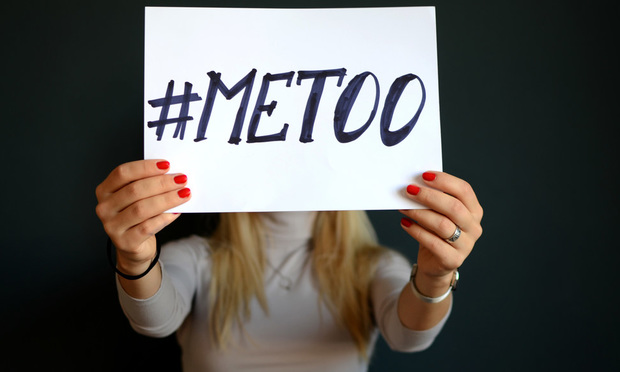Law Profs Swept Up in the #MeToo Movement
Here's a rundown of legal academics who have recently been investigated or are currently under investigation for possible misconduct and violations of Title IV.
December 05, 2018 at 10:48 AM
7 minute read

The legal academy is having its own #MeToo reckoning. The past year or so has seen a spate of law professors and administrators come under the microscope for their questionable conduct with students and staff.
No doubt, law campuses have always had their share of creeps and line-crossers. Remember former Case Western law dean Lawrence Mitchell, who resigned in 2014 amid allegations that he had a sexual relationship with a student and sexually harassed others? Or Sujit Choudhry, who was ousted from his perch running the University of California, Berkeley School of Law after his assistant sued claiming sexual harassment?
It's difficult to say whether the #MeToo movement is prompting more complaints of misconduct on law campuses, or whether misconduct investigations are simply garnering more attention now that the movement has placed a national spotlight on those who use positions of power and authority to take advantage of others.
Regardless, here is a rundown of recent, publicly disclosed misconduct investigations centered on legal academics. Some have wrapped up with sanctions doled out, while others remain open, including the recently launched investigation into Indiana University Maurer School of Law professor Ian Samuel.
Eric Dannenmaier, Northern Illinois College of Law, February 2017. The sexual harassment case against former Northern Illinois Dean Eric Dannenmaier technically predates the #MeToo movement, though it wrapped up just a few months before the Harvey Weinstein revelation that brought it to the fore. Dannenmaier was dean of the school for just nine months before two employees filed sexual harassment allegations against him. The female employees, who had both quit by the time they complained to the university, said the dean had subjected them and students to graphic, sexual comments.
The university launched a Title IX investigation and Dannenmaier did not categorically deny making the comments in question. Investigators noted that his story shifted over time while the complainants' remained consistent. University officials determined that there was enough credible evidence to conclude that the dean had created a hostile working environment for the complainants. He was placed on voluntary leave in February and resigned in June, a year after assuming the deanship. Dannenmaier could not be reached for comment.
Jeffrey Standen, Northern Kentucky University Chase College of Law, November 2017. Former law dean Jeffrey Standen resigned last December after three women filed harassment complaints against him the previous month. The complainants—one employee and two students—claimed that the then-dean forced them to do demeaning things, such as standing on a table while wearing a dress to reach an air vent and picking up items from the floor while he watched them bend over. He also made repeated requests for hugs.
The university's monthlong investigation concluded that there was not enough evidence to support a finding of sexual misconduct, but that Standen had fostered a work environment rife with an “unhealthy culture of fear, intimidation and bullying.” Standen did not respond to a request for comment on the matter, but earlier he denied acting inappropriately with law school employees and students. Still, he voluntarily resigned the deanship. He remains on the law faculty.
Jed Rubenfeld, Yale Law School, Spring 2018. Yale Law School reportedly launched a Title IX investigation into faculty superstar Jed Rubenfeld in the spring after numerous female students complained that his conduct with them crossed boundaries. Some said his behavior constituted sexual harassment, according to this Slate article that explored the sometimes blurry line between mentorship and misconduct . A law school spokeswoman did not respond to requests for comment this week on the investigation and its status, though Dean Heather Gerken said in a public statement in September that the school is taking the matter seriously. (The school has not publicly confirmed the existence of an investigation.)
The crux of the Rubenfeld matter seems to center on his role as an influential mentor with connections that help students land coveted clerkships, and whether he used that status to cross certain lines. Former students told Slate that Rubenfeld scheduled late-night one-on-one meetings with them; that he drank to excess with students; and made inappropriate, sexually tinged comments both individually and in class. Rubenfeld did not respond to a request for comment but previously said the allegations could stem from his controversial writing on legal topics.
Todd Bruno, Charleston School of Law, July 2018. Todd Bruno was the director of legal research, analysis and writing at the Charleston School of Law before resigning his position after numerous female students lodged complaints that he had groped them and made sexually inappropriate comments to them. According to a leaked copy of the report that resulted from the school's investigation, circulated by local news site FitsNews, the school had received seven complaints about Bruno in the previous six months, stemming from incidents between 2016 and 2018.
Many of the complaints stemmed from Bruno's position as a moot court and trial advocacy team adviser, where he reportedly drank heavily during out-of-town competitions and groped several students. Multiple students reported that Bruno placed his head on their breasts while out at bars, according to the report. Bruno denied the allegations, but investigators concluded it was more likely than not that the claims against him were credible. The school reportedly reached a monetary settlement with the three complainants, but it declined to comment on Bruno other than to confirm that he is no longer on the faculty.
Jay Kesan, University of Illinois College of Law, October 2018. Professor Jay Kesan's alleged misconduct took place before 2015, but the university did not complete its Title IX investigation until 2017. And the existence of that investigation didn't go public until October, when an NPR affiliate obtained the resulting report through an open records request. The investigation stemmed from multiple complaints that Kesan had acted inappropriately with students and faculty. One student reported that Kesan had rubbed her thigh; another said he invited her to stay at his apartment; and a faculty member told investigators that he asked invasive questions about her sex life.
The investigators concluded that his behavior violated the campus code of conduct but did not rise to the level of sexual misconduct. (He was required to undergo sexual harassment training.) But news of the investigation prompted a backlash among Illinois law students, with the Student Bar Association calling for his resignation. Law Dean Vik Amar said that the law school must follow established personnel procedures, and he encouraged students to reform how the university handles misconduct cases. Kesan is taking a one-year unpaid leave and did not respond to a request for comment.
Ian Samuel, Indiana University Maurer School of Law-Bloomington, November 2018.
 Ian Samuel
Ian SamuelIndiana University has launched a Title IV investigation into professor Ian Samuel, who is in his first semester teaching at the Bloomington law school. Details are scarce at this point about the allegations against Samuel, who is also the co-host of the Supreme Court podcast First Mondays, though university officials on Friday confirmed the existence of an investigation and law dean Austen Parrish told students that Samuel had voluntarily checked himself into a hospital. (Samuel did not respond to multiple requests for comment.)
Title IX investigations typically center of claims of sexual harassment or misconduct, but not always. Samuel is a prominent name in the legal academy, having spurred the national law student movement against mandatory arbitration agreements at large law firm when he circulated a leaked copy of the clause Munger, Tolles & Olson used for summer associates. (The firm quickly ended mandatory arbitration for summer associates amid the backlash.)
This content has been archived. It is available through our partners, LexisNexis® and Bloomberg Law.
To view this content, please continue to their sites.
Not a Lexis Subscriber?
Subscribe Now
Not a Bloomberg Law Subscriber?
Subscribe Now
NOT FOR REPRINT
© 2025 ALM Global, LLC, All Rights Reserved. Request academic re-use from www.copyright.com. All other uses, submit a request to [email protected]. For more information visit Asset & Logo Licensing.
You Might Like
View All
Statute of Limitations Shrivels $5M Jury Award to Less than $1M, 8th Circuit Rules
4 minute read
Read the Document: DOJ Releases Ex-Special Counsel's Report Explaining Trump Prosecutions
3 minute read
Arizona Board Gives Thumbs Up to KPMG's Bid To Deliver Legal Services

Goodwin to Launch Brussels Office With Quinn Emanuel Antitrust Partner
3 minute readTrending Stories
Who Got The Work
J. Brugh Lower of Gibbons has entered an appearance for industrial equipment supplier Devco Corporation in a pending trademark infringement lawsuit. The suit, accusing the defendant of selling knock-off Graco products, was filed Dec. 18 in New Jersey District Court by Rivkin Radler on behalf of Graco Inc. and Graco Minnesota. The case, assigned to U.S. District Judge Zahid N. Quraishi, is 3:24-cv-11294, Graco Inc. et al v. Devco Corporation.
Who Got The Work
Rebecca Maller-Stein and Kent A. Yalowitz of Arnold & Porter Kaye Scholer have entered their appearances for Hanaco Venture Capital and its executives, Lior Prosor and David Frankel, in a pending securities lawsuit. The action, filed on Dec. 24 in New York Southern District Court by Zell, Aron & Co. on behalf of Goldeneye Advisors, accuses the defendants of negligently and fraudulently managing the plaintiff's $1 million investment. The case, assigned to U.S. District Judge Vernon S. Broderick, is 1:24-cv-09918, Goldeneye Advisors, LLC v. Hanaco Venture Capital, Ltd. et al.
Who Got The Work
Attorneys from A&O Shearman has stepped in as defense counsel for Toronto-Dominion Bank and other defendants in a pending securities class action. The suit, filed Dec. 11 in New York Southern District Court by Bleichmar Fonti & Auld, accuses the defendants of concealing the bank's 'pervasive' deficiencies in regards to its compliance with the Bank Secrecy Act and the quality of its anti-money laundering controls. The case, assigned to U.S. District Judge Arun Subramanian, is 1:24-cv-09445, Gonzalez v. The Toronto-Dominion Bank et al.
Who Got The Work
Crown Castle International, a Pennsylvania company providing shared communications infrastructure, has turned to Luke D. Wolf of Gordon Rees Scully Mansukhani to fend off a pending breach-of-contract lawsuit. The court action, filed Nov. 25 in Michigan Eastern District Court by Hooper Hathaway PC on behalf of The Town Residences LLC, accuses Crown Castle of failing to transfer approximately $30,000 in utility payments from T-Mobile in breach of a roof-top lease and assignment agreement. The case, assigned to U.S. District Judge Susan K. Declercq, is 2:24-cv-13131, The Town Residences LLC v. T-Mobile US, Inc. et al.
Who Got The Work
Wilfred P. Coronato and Daniel M. Schwartz of McCarter & English have stepped in as defense counsel to Electrolux Home Products Inc. in a pending product liability lawsuit. The court action, filed Nov. 26 in New York Eastern District Court by Poulos Lopiccolo PC and Nagel Rice LLP on behalf of David Stern, alleges that the defendant's refrigerators’ drawers and shelving repeatedly break and fall apart within months after purchase. The case, assigned to U.S. District Judge Joan M. Azrack, is 2:24-cv-08204, Stern v. Electrolux Home Products, Inc.
Featured Firms
Law Offices of Gary Martin Hays & Associates, P.C.
(470) 294-1674
Law Offices of Mark E. Salomone
(857) 444-6468
Smith & Hassler
(713) 739-1250








